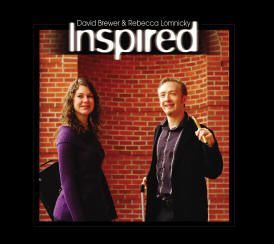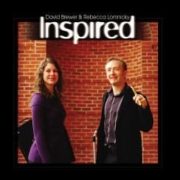BREWER LOMNICKY – INSPIRED
ARTIST: DAVID BREWER AND REBECCA LOMNICKY
TITLE: INSPIRED
LABEL: DAVID BREWER/MOLRI MUSIC
RELEASE DATE: JUNE 2010
 Inspired is a CD of elegant Scottish music by David Brewer, the piper and whistle player in the Celtic band Molly’s Revenge, and Rebecca Lomnicky, a young fiddler from Oregon. “Elegant” or perhaps “stately” seem to be the best words to capture the atmosphere, in particular the fiddle style. It is slower and more refined than old-time or Irish fiddling, but it is not classical music either. If you are not familiar with this genre, this CD is a good introduction. If you are already a fan Alasdair Fraser and Natalie Haas, Inspired will be an enjoyable addition to your CD collection. An important difference to Alasdair Fraser’s recordings, however, is the timbre added by David Brewer’s bagpipes and whistles.
Inspired is a CD of elegant Scottish music by David Brewer, the piper and whistle player in the Celtic band Molly’s Revenge, and Rebecca Lomnicky, a young fiddler from Oregon. “Elegant” or perhaps “stately” seem to be the best words to capture the atmosphere, in particular the fiddle style. It is slower and more refined than old-time or Irish fiddling, but it is not classical music either. If you are not familiar with this genre, this CD is a good introduction. If you are already a fan Alasdair Fraser and Natalie Haas, Inspired will be an enjoyable addition to your CD collection. An important difference to Alasdair Fraser’s recordings, however, is the timbre added by David Brewer’s bagpipes and whistles.
About half of the tunes are new compositions by Lomnicky and Brewer, the rest are mainly older tunes, with a few other compositions by modern composers. The most prominent instrument on the CD is fiddle, David keeps himself busy on a variety of other instruments: Highland pipes, smallpipes, guitar, whistles, bodhran, mandolin. There is plenty of bagpipe playing here, but if you are looking for a CD focused on bagpipes, I highly recommend David’s previous solo CD (you can find a review on FolkWorks as well). Guest musicians Natalie Haas (cello) and Jeffrey Spero (piano) add other textures to the sound.
Many people associate Scottish folk music exclusively with the Highland Bagpipe, but there has been a long tradition of fiddle music going back to the 1700s. It was not pure “folk” music, because the best known fiddlers were well educated professional musicians, often enjoying the patronage of aristocrats, but it was not classical music either. Scottish fiddle music had a tremendous influence on American folk music and many American old-time tunes (including Soldier’s Joy and Devil’s Dream) can be immediately traced back to old Scottish publications, sometimes even to a specific composer (Old Molly Hare is a variation of Nathaniel Gow’s Fairy Dance). There are a few tunes on this CD from that period, including a set of tunes by Robert Mackintosh probably composed around 1790 (track 3, Lady Elizabeth Cole).
The appearance of the cello seems surprising because of the exclusive association of cello with classical music. But the cello actually had a life outside classical music and Natalie Haas revives a centuries-old tradition in Scottish dance music. Niel Gow, a contemporary of Mackintosh, for example, performed regularly at dances in a small band that included his brother Donald on cello. They would walk miles to play a dance, drink a great deal, then stagger home.
I like Inspired a lot and have listened to it many times already. My only criticism is one track and that is Amazing Grace. It is a lovely version (I did listen to it twice), but this tune is just too overplayed for my taste and I deleted it from my playlist. I can see their rationale for including it: The bread and butter of a professional bagpiper is playing Amazing Grace at funerals and weddings and adding this track probably sells more CDs than anything else they could have done. I like all the other tracks on the CD and among my favorites are the gentle strathspey of the title track (pretty mandolin introduction and then mainly fiddle/cello), the Mackintosh reels (fiddle, cello, guitar, with a bit of whistle at the end), the wilder bagpipe on The Panda, or the haunting Highland pipe and violin duet on Mrs. Forsyth’s Pibroch (Manse Of Abernethy). Maybe I should pick the last track as my favorite because the pipe/violin duet is the most unique.
This CD was not available when David played with Molly’s Revenge at the 50th Topanga Banjo Fiddle Festival last month. But he will be back in the Los Angeles area this month, with Molly’s Revenge (June 25 at CTMS). Since this is a brand new CD, David has a lot of copies of that CD at home. He probably doesn’t need all of them or you can purchase them at CDBaby.
Roland Sturm is Professor of Policy Analysis at the RAND Graduate School and usually writes on health policy, not music. He is the talent coordinator of the Topanga Banjo Fiddle Contest and leads the monthly Celtic sessions at CTMS. These days he mainly plays upright bass and mandolin













